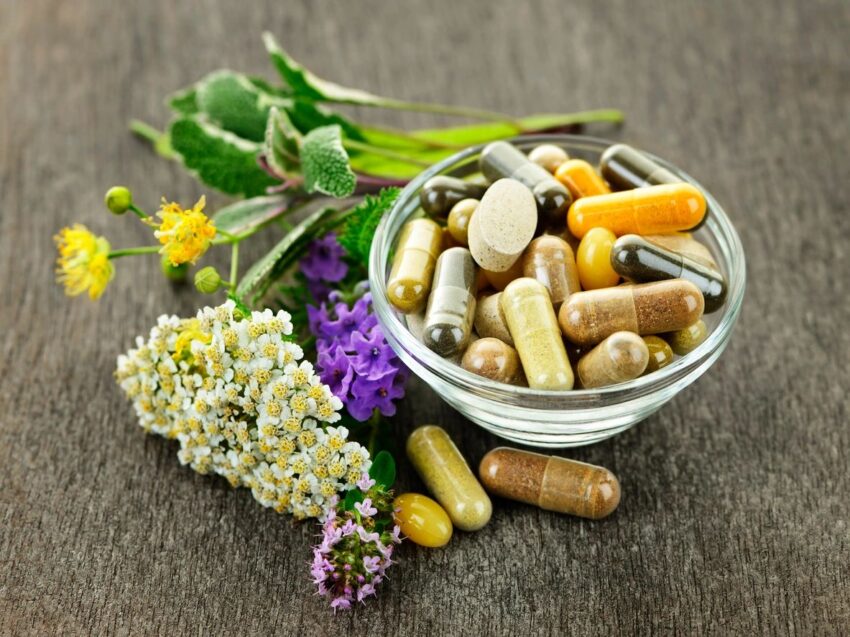Do I Need Postpartum Vitamins? (From A Dietitian)

It seems like there is SO MUCH information about prenatal vitamins and what to eat during pregnancy, which makes sense because growing a baby requires a lot from our bodies! But, when it comes to postpartum nutrition and supplementation, mom’s aren’t given much. Which makes many question: do I need postpartum vitamins? If so, which ones? Which is the best? What do I take? For how long? And so on. We’ll discuss all of that here so you can thrive during the postpartum period and motherhood, and feel good about nourishing yourself and your new baby.
Disclaimer: This article is for information purposes only and should not be used as medical advice or individual recommendations. This post contains affiliate links. Any purchases made using these links will result in a small commission for me, but at no extra cost to you. All opinions are my own. You can read about my affiliate disclaimer here.
Replenishing your body postpartum
First, growing and delivering a baby (no matter the method) takes a lot out of us! Our babies have needed to rely on us for nutrients for nine months, depleting our stores. Then, our bodies need additional nutrients to heal from the placenta (a.k.a dinner plate)-sized wound inside the uterus and any vaginal tearing or c-section incisions. And, if you are breastfeeding your caloric and certain nutrient needs increase as well.
So, it’s almost as if you are starting this big, long energy-expending, nutrient-depleting adventure on empty. Like if you began running a marathon having never trained (if you’re a new mom, life is VERY different and there’s nearly no way of preparing for it), didn’t fuel properly, and perhaps even got a bad night’s sleep the night before – or for some moms, multiple weeks, or even months of poor sleep beforehand. YIKES! Then, you’re handed a baby. Now, not only are you starting this journey depleted, but you also have another human to take care of around the clock, which can make nourishing yourself and staying well-rested really, really, REALLY hard.
And the catch-22 is, you know if you were well-nourished and rested, taking care of this tiny human would be much easier! So what do you do?

What are postpartum vitamins?
Postpartum vitamins, or postnatal vitamins, are supplements specifically formulated for women to take after childbirth.
Do I need postpartum vitamins?
It can be helpful continue taking your prenatal vitamin, or switch to a postnatal vitamin as long as you are still getting 27 mg iron for three months postpartum (see Iron for more info). A vitamin can help your body heal and support your nutrition needs as well as your baby’s if you’re breastfeeding. While I usually take a food-first approach, I also know that the early days of postpartum, especially for new moms can be a whirlwind and complete culture shock. You are trying to figure out how to take care of a newborn, and while it definitely IS important to eat well (and I will cover this in a future article), it can also be difficult to do so.
Even women who are no longer in the postpartum period, but in the throws of motherhood find it hard to eat healthily and take time to prepare food for themselves. How do I know? I work with a lot of moms, and this is what we spend most of our time on: how to get what we need with less time. So, for the time being, a vitamin supplement can help fill in the gaps. I also wanted to write this article for the all the questions I do get about postpartum vitamins.
How long do I take postpartum vitamins?
Recommendations on how long to take postpartum vitamins vary between six weeks to the duration of breastfeeding, and it may really depend on various factors: diet, birth and recovery, a tendency towards anemia, etc. It may also depend on whether or not you plan to get pregnant again and when. It’s recommended to take a prenatal vitamin at least 3 months prior to conceiving, but one can be taken for up to a year prior to conceiving. I mention this because some women get pregnant again before their baby is one year old.
Are prenatal vitamins different than postnatal vitamins?
Some moms may be advised to simply continue taking the prenatal vitamin they were taking during pregnancy, which can be great! There are, however, a few changes in nutrient needs to consider between prenatal and postnatal vitamins, and why someone may want to make a switch when taking vitamins postpartum.
Iron
It is recommended to continue taking iron and folic acid supplements (like that in a prenatal) for at least 3 months postpartum (1). This helps replenish nutrients lost during birth. After this point, iron needs can drop from 27 mg/day during pregnancy/early postpartum to only 9 mg/day (2) if a mom is not yet bleeding monthly – this varies greatly! Some women get their period back shortly after birth, while others may not get it back for a year or more. Oftentimes, postnatal vitamins will contain less iron for this reason.
Omega-3 Fats
It is important to continue supplementing with omega-3 fats, or consume 8-12 ounces of fish per week postpartum. Recommendations seem to vary, however, the NIH recommends a total of 1300mg omega-3 fats (3), and Dr. Keri Marshall, ND who writes for the American Pregnancy Association recommends aiming for 625 mg DHA and 410mg EPA if you are lactating (4). This nutrient is vital for both baby’s brain development as he/she will get it through breast milk. Not only that, it’s helpful for supporting mom’s health. Omega-3 fats can help lift postpartum depression and anxiety, support mom’s immune system and healing, and lower inflammation.
Choline
Choline needs increase while breastfeeding! Recommendations increase from 450 mg/day during pregnancy to 550 mg/day during lactation (5). Again, it’s a nutrient the baby gets through breast milk that is important for brain development. This nutrient can be gained through a supplement and through food. Good sources of choline include eggs (1 large egg is 147mg), beef, soybeans, and many fruits and vegetables.
Iodine
Iodine needs increase slightly from 220 ug during pregnancy to 290 ug during lactation (6), so it’s recommended that pregnant and lactating women take 150 ug of iodine daily as diet alone may not be sufficient (6). Iodine is a key nutrient in thyroid function, which, if deficient (or excessive), can affect metabolism, growth, and development (7). Food sources of iodine include seaweed (116 ug/2 tablespoons dried), fish, dairy, and eggs (6).
Vitamin D
Nutrient needs are the same for both pregnant and lactating women, however, for mental health and energy, it is important for moms to continue supplementing with vitamin D, or get outside without sunscreen and lots of skin exposure for at least 5-30 minutes, 7-2 days a week (8)- which is a tough feat for those in the northeast when it’s cloudy and 15 degrees!
It’s also recommended that breastfed babies supplement with 400 IU of vitamin D since breast milk alone does not provide enough (unless a mom were to consume well over the tolerable upper limit of 4000 IU (8)). Some research suggests it’s safe for breastfeeding women to take up to 6400 IU of vitamin D per day, which would be enough to support both mom’s and baby’s needs without additional supplementation for baby (9), however, it’s important to discuss this with your doctor and have your vitamin D levels assessed since this amount is over the safe limit.
Additionally, there are very few foods that provide vitamin D naturally. These include fatty fish, eggs, and some mushrooms if they’ve been exposed to UV light. Otherwise, many foods are fortified with vitamin D, like milk and cereal. The best source is the sun, and unfortunately, getting outside for an adequate amount of time isn’t always possible with a newborn. For example, my children were born in the fall and winter, which is pretty cold and cloudy where we live during these months. So, I got outside when I could, but have also needed to supplement, and that’s the key word! A supplement is not a replacement to other healthy habits. We still want to aim to get outside and enjoy vitamin D-rich foods if we can, but a postpartum vitamins acts as an insurance policy.

So, what’s a good postpartum vitamin?
If you choose to continue taking your prenatal, here are some great options.
If you choose to switch to a postnatal vitamin, these are some options to consider:
- MegaFood Baby & Me 2 Postnal Multi
- Includes 200 mg choline, but no DHA
- Ritual Prenatal Multivitamin
- Includes DHA, but only 55 mg choline (this can be obtained from diet, but a supplement may be helpful if diet quality is not ideal)
- Perelel Mom Multi Support Pack
- DHA is included in the pack; the multivitamin includes 120 mg choline; the pack also includes cognitive as well as hair, skin, and nails support
- Nature Made Postnatal Multi + DHA
- Contains DHA, but no choline; an affordable option
If you would like personalized recommendations and advice based on you and your diet, consult with a dietitian!
There are a number of options I looked at, but didn’t include here for various reasons, mainly because they didn’t meet my standards for safety for most women, were less affordable, or would need too many extra supplements to meet all nutrient requirements.
Personal preference: After my first pregnancy, I immediately switched from MegaFood Baby & Me 2 Prenatal Multi to the Postnatal, not realizing I still needed extra iron. After my second pregnancy, I switched solely to FullWell (I had been alternating MegaFood and FullWell during pregnancy) without adding much iron in the first 3 months, again, not realizing I needed extra.
If I were to do it again, I’d personally take FullWell and include an iron supplement, OR continue MegaFood Prenatal for three months before switching to FullWell.
In both of these scenarios I would also be more diligent about continuing with a DHA supplement (Nordic Naturals or FullWell) postpartum as well. I took one after my first two pregnancies, but I often forgot, so I wasn’t consistent, and eventually stopped taking it at some point due to life getting busy. But, not taking it definitely impacted my mental health. Once I added it back it, it helped a lot!

Other nutrients to consider
Magnesium
Magnesium is a mineral that is used in over 300 enzyme systems in the body that are involved in various biochemical reactions such as protein synthesis, blood sugar and blood pressure regulation, and muscle and nerve function (10). It is a mineral that helps the body relax and stay calm. So, if you’re struggling with increased feelings of stress or anxiety, irritability, or sleep, it may be beneficial to pay attention to magnesium. It can be found in foods like nuts (almonds), seeds (particularly pumpkin and chia), spinach, and beans and legumes (edamame, peanuts) (10), or discuss supplementation with a dietitian.
Probiotics
A healthy gut microbiome is linked to overall health including better energy, digestion, skin, and mental health. Some research suggests one specific bacterial strain, Lacticaseibacillus rhamnosus HN001 (not to be confused with Lactobacillus rhamnosus HN001 – they are similar, but not the same), specifically helps reduce postpartum depression symptoms in women if supplementation is continued after giving birth (11). Similar results were not seen with other strains, however, more research is needed. This strain can be found in the probiotic supplement from FullWell (get 20% off using this link).
Probiotics in general, however, whether from food or supplements can be beneficial overall for healthy digestion (and thus mood, energy, immune function, etc.), especially since some women find their digestion changes postpartum, whether they contain this strain or not. So, if you are eating probiotic-rich foods like yogurt, kefir, kombucha, or sauerkraut, or taking a supplement, it can likely have a positive impact.
A note about FullWell:
I was actually surprised (and also not surprised) that FullWell is the only US-based brand I could find that is currently available and marketed as safe and effective for pregnancy that includes this strain. I thought I would find a handful of brands that included it.
But, it also doesn’t surprise me since FullWell was started by a Dietitian in order to get better prenatal supplements available for women. Their products are research-backed and they offer information about how and why the products are formulated and who might benefit from them. I love what FullWell is doing, and I love their products, which is why I became an ambassador for them. I only realized they offered this strain in their supplement after reading the research on probiotics and trying to find a probiotic for myself. I checked to see if FullWell had this strain, and they DID! All this to say, I’m not just providing FullWell as an option because I’m an ambassador, they really just ARE the option, and I was very excited to see they had this strain.
Collagen/Bone Broth
While our bodies make collagen, provided we’re eating enough vitamin C, some women may find benefit from taking additional collagen through powders or bone broth, which contains collagen. Collagen is a building block of healthy skin, hair, and nails, and helps healing the body postpartum. Not everyone benefits from collagen, though! Why? Read more here.
Conclusion & key take away’s for postpartum vitamins
- It is recommended to continue supplementation with prenatal or postpartum vitamins for at least 6 weeks as long as you are getting sufficient iron (supplements vary). This helps replete the body’s lost nutrients and aids recovery, healing, and supporting the body, and baby through breastfeeding.
- Important nutrients to be mindful of postpartum include iron, iodine, vitamin D, choline, and omega-3 fats.
- Other nutrients to consider postpartum that can be beneficial for healing and mental health include magnesium, probiotics, and collagen.
Want more individualized recommendations? Meet with a dietitian!
Sources
- WHO Recommendations on Postnatal Care of the Mother and Newborn. Geneva: World Health Organization; 2013 Oct. https://www.ncbi.nlm.nih.gov/books/NBK190090/
- Iron. National Institutes of Health. October 9, 2024. https://ods.od.nih.gov/factsheets/Iron-HealthProfessional/
- Omega-3 Fatty Acids. National Institutes of Health. December 17, 2024. https://ods.od.nih.gov/factsheets/Omega3FattyAcids-HealthProfessional/.
- Marshal, Keri. Preventing the Baby Blues. American Pregnancy Association. https://americanpregnancy.org/healthy-pregnancy/first-year-of-life/preventing-the-baby-blues/.
- Choline. National Institutes of Health. June 2, 2022. https://ods.od.nih.gov/factsheets/Choline-HealthProfessional/.
- Iodine. National Institues of Health. November 5, 2024. https://ods.od.nih.gov/factsheets/Iodine-HealthProfessional/.
- Andersson, Maria, Braegger, Christine P. The Role of Iodine for Thyroid Function in Lactating Women and Infants. Endocr Rev. 2021 Nov 17;43(3):469–506. doi: 10.1210/endrev/bnab029
- Vitamin D. National Institues of Health. July 26, 2024. https://ods.od.nih.gov/factsheets/VitaminD-HealthProfessional/.
- Hollis, Bruce W., et al. Maternal Versus Infant Vitamin D Supplementation During Lactation: A Randomized Controlled Trial. Pediatrics. 2015 Oct;136(4):625-34. doi: 10.1542/peds.2015-1669.
- Magnesium. National Institutes of Health. June 2, 2022. https://ods.od.nih.gov/factsheets/Magnesium-HealthProfessional/.
- Trifkovič, Klavdija Čuček; et al. Efficacy of Direct or Indirect Use of Probiotics for the Improvement of Maternal Depression during Pregnancy and in the Postnatal Period: A Systematic Review and Meta-Analysis. Healthcare (Basel). 2022 May 24;10(6):970. doi: 10.3390/healthcare10060970




Leave a Reply